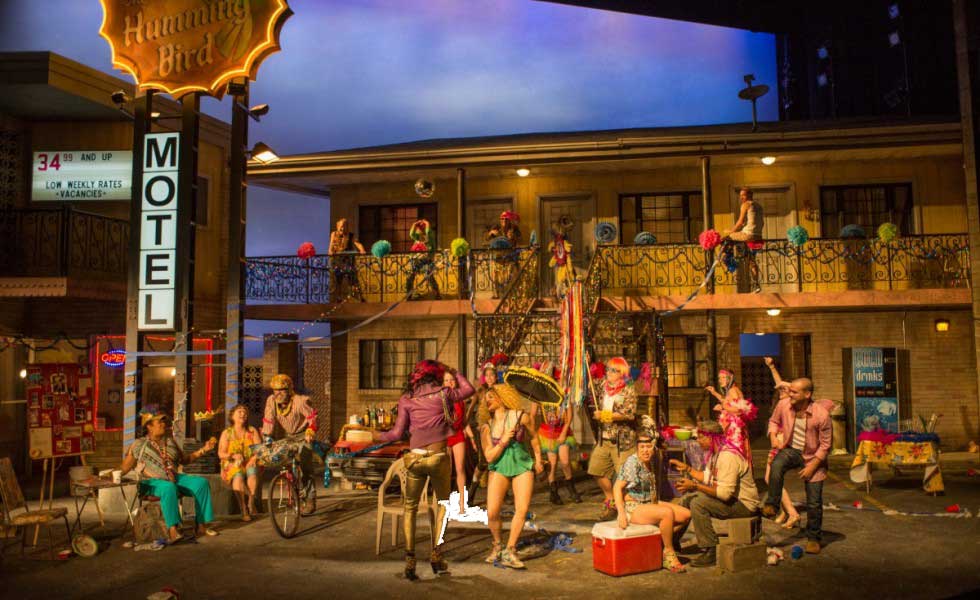CHICAGO: This time around Chicago Theatre Week is a bit of a misnomer—it actually runs 11 days, Feb. 12–22. The expansion of the discounted-ticket theatre program, now in its third year, is a result of high ticket sales and the emergence of new audiences for theatres across the city.
“They are selling tickets they wouldn’t otherwise sell,” says Deb Clapp, executive director of the League of Chicago Theatres, which runs the program. Clapp says there were more than 8,000 attendees in 2014; she expects more this year. “If you ask me what’s the single most important thing you could do as a theatre, I would tell you that’s it.”
The program offers discounted $15-$30 tickets for more than 100 productions, including sketch and improv comedy, children’s theatre and two shows headed for Broadway, Airline Highway at Steppenwolf Theatre Company and the commerical musical First Wives Club. The week offers both smaller and larger theatres the chance to reach new audiences. “Believe it or not, there are people out there who’ve never been to the Goodman before,” says Clapp. “So getting new people in, for them that’s like gold.”
Before the event officially kicked off this year, Collaboraction had already sold half of its house to people who’d previously never seen one of the company’s shows. The company, founded in 1996, sees an average yearly audience of about 15,000.
“We need to make sure we always have a show during theatre week,” says artistic director Anthony Moseley. “It’s about butts in seats at the end of the day.”
In recent years, Collaboraction has shifted its mission towards local social issues, like gun violence and education. The company’s Theatre Week offering is a remount of Forgotten Future: The Education Project, which follows three Chicago Public Schools students through their issues with both school bureaucracy and violence outside the classroom. On Collaboraction’s website, ticket buyers also have the option to donate additional funds towards basic supplies for locals schools.
“We used to spend a good amount on print ads; those days are gone,” says Mosley. “Your resources now are going to a publicist, to video, You Tube, social media. It’s also about going into neighborhoods and cultivating groups there.”
Revenue from single-ticket buyers has grown by almost eight percent nationwide since 2009, according to Theatre Communications Group’s 2013 Fiscal Survey. Steppenwolf has reworked its marketing strategy around that data. The theatre has two shows available for Theatre Week: Marie Antoinette, David Adjimi’s modern take on the French queen, and Lisa D’Amour’s Airline Highway, which transfers to Broadway in April.

Since 2007, Steppenwolf, which had more than 155,000 ticket buyers during its 2013–14 season, has been shifting away from its subscription model and moving toward rewarding multi-ticket buyers, according to a 2011 Wallace Foundation study.
In addition to more post-show discussions and plans for a $50 million space that will support community and teen programming, Steppenwolf also began offering multi-ticket buyers traditional subscriber benefits like special presale offers and opportunities to sit in on artist talks. Many multi-ticket buyers are twenty- to thirtysomethings who don’t necessarily want to purchase an upfront subscription.
“For millennials, it was like, ‘You need me to commit to a certain night next May? I don’t know where I’m even going to be living or working,’” says John Zinn, the theatre’s director of marketing and communications. “We had to figure out new ways to roll with the millennials and Gen Xers’ lifestyles.”
Strawdog Theatre Company, another smaller Chicago company, which has been around since the late 1980s, used Theatre Week to showcase The Sweeter Option, a new play from ensemble member John Henry Roberts, which marks the company’s 100th production.
“We are a small storefront theatre with almost no marketing budget,” explains Strawdog artistic director Hank Boland, who says 95 percent of presale tickets for Sweeter Option were coming from new buyers. “It’s an opportunity to engage with people. It’s an opportunity to get people in to engage with new work in our space.”
According to a 2012 National Endowment for the Arts study, attendance at both plays and musicals have dropped since 2008, including a 12 percent decrease in the number of adults nationwide who attended a play over those four years.
“It’s an industry-wide challenge,” said Kate Lipuma, executive director of Writers Theatre. “Marketing is the easiest thing to cut, and it’s the one thing you shouldn’t cut.”
Lipuma, who chairs the board of directors for League of Chicago Theatres, said the decision to expand the event ended up being a no-brainer; the demand is there for both local theatres and attendees alike.
“February is cold and sad in Chicago, so [Chicago Theatre Week] is great for theatres,” she said. “I went online yesterday and five or six of the shows I wanted to see were already sold out. People are snatching up those tickets, and it’s fantastic.”


